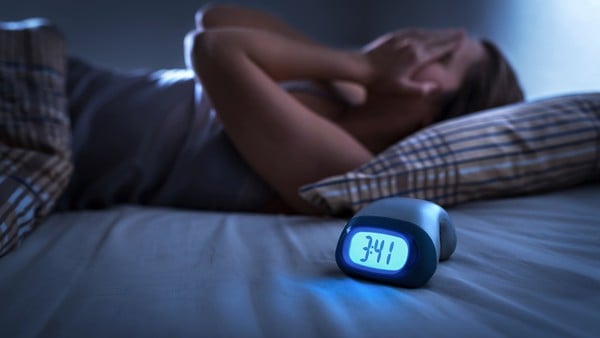Global Courant 2023-05-19 13:01:06
It’s almost an automatic reflex in people who suffer from insomnia: striving to sleep without success, they look at the clock to see how much sleep they have left, and get into a frustrating vicious cycle that only makes things worse.
This was revealed by the study “Use of sleep aids in insomnia: the role of time monitoring behavior”, published in the journal in The Primary Care Companion for CNS Disorders.
The work led by Spencer Dawson, from the Department of Psychology and Brain Sciences at the College of Arts and Sciences at Indiana University (United States), concluded that looking at the clock while trying to fall asleep exacerbates insomnia and the use of sleeping pills
What is insomnia and how is it treated?
Insomnia is a common sleep disorder. Beyond the nocturnal symptoms and the complications that it brings the next day as a result of poor rest, it is also associated with long-term health problems, which include everything from cardiovascular disease and diabetes to depression.
Treatment guidelines recommend cognitive behavioral therapy for chronic insomnia in adults. However, barriers to accessing this alternative persist, especially in comparison with the use of sleep medications, the study highlighted.
“Over-the-counter and prescription sleep medications are frequently used as treatments for chronic insomnia, despite risks and limited long-term efficacy,” the researchers noted.
And they stated that the aim of the study was to determine how time-control behavior (watching the clock) and the frustration associated with that behavior might interact with insomnia symptoms to drive the use of sleep-promoting products.
For the research, Dawson’s team gathered data from nearly 5,000 patients who received care at a sleep medicine clinic between May 2003 and October 2013.
Participants filled out questionnaires about the severity of their insomnia, answering whether they used sleep medications and how much time they spent monitoring their behavior as they tried to fall asleep. They were also asked to report if they had been diagnosed with any psychiatric disorder.
Once that information was gathered, the researchers performed a mediation analysis to determine how the factors influenced each other.
They advise avoiding naps or limiting them, to promote night sleep. Shutterstock.
Insomnia, clock and medicines
“We found that time-monitoring behavior has an effect primarily on sleep medication use because it exacerbates symptoms of insomnia,” Dawson said.
The researcher explained that people who suffer from insomnia worry about not getting enough sleep, “then they start to estimate how long it will take them to go back to sleep and when they have to get up.”
That act only makes things worse. “It’s not a useful activity to facilitate the ability to fall asleep, because the more stressed a person is, the more difficult it is for them to sleep,” he noted.
As frustration with insomnia grows, people are more likely to use sleep aids.
Poor sleep is associated with increased sleepiness during the day. Photo Shutterstock.
take the clock out of the room
Given the results, Dawson noted that a simple behavioral intervention could help those who suffer from insomnia. “Turning or covering the clock, taking off the smartwatch, taking the cell phone out of the room all help to stop looking at the time,” she said. “When trying to fall asleep, at no time is it helpful to look at the clock,” she stressed.
10 tips to sleep better
In Argentina, it is estimated that almost half of adults suffer from some sleep disorder.
In her book “The dream route” (published by delhospital editions of the IUHIBA), neurology doctor Stella Maris Valiensi lists 10 tips to prevent sleep disorders and maintain a healthy routine, in addition to avoiding looking at the clock.
1. Establish a fixed time to go to bed and get up. Constant changes in sleep schedules increase the likelihood of severe and chronic sleep difficulties.
2. Stay in bed long enough. After being in bed for a while without being able to sleep, it is recommended to move to another room and do another activity that requires little energy, such as reading a magazine or watching television. When sleep returns, return to the bedroom. The goal is to associate the bed with falling asleep as soon as possible.
3. Avoid napping and situations that encourage it. In specific cases, a nap can be allowed after eating, lasting no more than 30 minutes.
4. Avoid carrying out activities in bed such as: watching television, reading, listening to the radio, eating, talking on the phone, arguing… The brain needs to associate the bedroom and the bed with the activity of sleeping.
5. Perform light exercise (eg walk) for at least one hour a day, with sunlight, preferably in the afternoon and always at least three hours before going to sleep. If vigorous exercise is performed in the 3 or 4 hours before bedtime, the nervous system can be activated and the feeling of sleepiness can be lost.
6. Incorporate each night a routine of actions that help prepare mentally and physically to go to bed. Brush your teeth, put on your pajamas, prepare your clothes for the next day, and incorporate relaxation exercises.
7. Taking a bath in water at body temperature has a relaxing effect, making it an activity that promotes sleep.
8. Avoid beverages that contain caffeine, such as colas and coffee, and alcohol and tobacco, since in addition to harming health, they impair sleep.
9. Keep the bedroom at a comfortable temperature and minimum levels of light and noise.
10. Try not to go to bed until two hours have passed since dinner. Hunger and copious meals can disturb sleep. Try not to drink excess fluids in the late afternoon and at night. With this you can avoid having to get out of bed to go to the bathroom.
***
➪ Do you have any questions about health and well-being that you would like us to address in section notes? Enter the Clarín Help Center by clicking here, enter Message to the newsroom and then Questions to Buena Vida. Write us your query and send. Ready!








